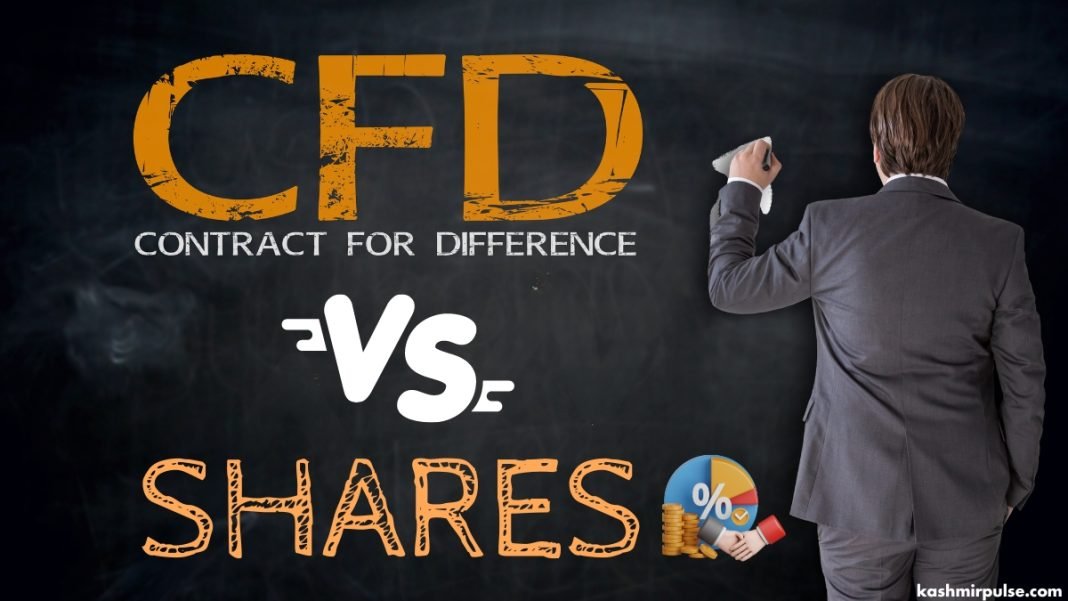When one considers investing in the financial markets, a whole range of options unfold, each with its own degree of benefit or risk. Among these, two of the best and the most popular investment instruments are CFDs and shares. Both instruments have distinctive opportunities, but they operate on an entirely different basis. For those looking for leveraged trading and diverse market access, Contracts for Difference or CFDs offer unique advantages, particularly in the context of CFD trading.
Understanding CFDs
Definition and Mechanism
CFDs are basically financial derivatives that allow a trader to speculate on price movements of diverse underlying assets without really owning them. Contracts for Differences are when a person exchanges the difference in the price of an asset from the time a contract is opened to the time a contract is closed. One earns if it goes in their favour; otherwise, losses are incurred.
Benefits That Come with CFD Trading
There are several advantages to CFD trading. Perhaps the most significant of these advantages is leverage. In trading, it facilitates opening positions that are fractions of the total trade value. This can increase potential returns but increases the risk as well. Secondly, CFDs grant access to a great variety of markets: shares, indices, commodities, and Forex trade, hence helping traders diversify their respective portfolios. CFDs also allow for short-selling, enabling traders to profit from falling prices.
Risks of CFD Trading
Although beneficial, CFDs carry high risk. Leverage can be risky as it is helpful while taking profits. In some cases, financial leverage could lead to massive financial loss. Moreover, the market can be highly volatile and prone to instant changes in price. Another drawback of CFD trading is the high fees and spreads in comparison with trading traditional stocks.
Understanding Shares
Definition and Mechanism
Shares are essentially a form of ownership in a company and are also referred to as stocks or equities. When buying shares, a person becomes a part owner of the company and has a claim on its assets and earnings. Shareholders can receive dividends, which are distributions of a portion of the profits the company generates, and possibly enjoy capital appreciation when the stock price goes up.
Merits of Investment in Shares
Buying shares can result in long-term capital growth and income in dividends. Shareholders have the right to vote on various key decisions within the company. If one has shares in good-performing companies then, over time, substantial returns can be expected from such investment. Share investing is, in most cases, for the medium to the long term periods; hence it goes hand in hand with wealth-building strategies.
Risks of Investing in Shares
Shares are exposed to market risk, which means that share prices can vary according to multiple factors such as the performance of the company, general economic conditions, and market sentiment. Companies performing badly can result in huge losses of capital.
How CFDs Differ from Shares
Ownership and Rights
The key difference between the two is ownership. When one buys shares, a portion of the company is owned, together with all the rights that come along with ownership, such as voting and dividends. However, CFDs do not bestow the buyer with any ownership of the underlying security. They are purely financial derivatives that depend solely on price fluctuation.
Leverage
CFDs are generally leveraged more significantly than shares. This means that traders are able to control larger positions with a smaller amount of equity. While leverage can amplify gains, it also increases the potential for large losses; thus proper risk management in CFD trading is important.
Costs and Fees
Generally, the costs of CFD trading are slightly higher, taking into consideration the spread, overnight financing charges, and commissions. Contrary to this, share trading has generally less costly fees, more so with the availability of discount brokers. However, in both cases, transaction fees and taxes may be charged depending on the trading platform and jurisdiction.
Market Access
CFDs make it convenient to access a wider range of markets that would otherwise not have been easy to reach, such as foreign stocks, commodities, indices, and Forex trading. This kind of flexibility makes it possible for a trader to diversify their investments and at the same time participate in all kinds of markets that would present themselves. Share trading will only remain mostly restricted to the stock exchange market and in company equities.
Practical Examples
Leveraged Position
For instance, consider a trader who is willing to invest $1,000 in a given stock. With the 10:1 leverage afforded by CFDs, they can achieve effective control over a position of $10,000. Assuming that the price of the underlying stock has risen by 5%, this position has a value of $10,500; in other words, his profit is $500, or 50%, from the original $1,000 invested. Of course, the price of that same stock falling 5% will result in a position value of $9,500 and a loss of $500. The large leverage offered amplifies both gains and losses in a big way.
Dividend Income
Consider an investor who buys $10,000 worth of shares in a company paying a 4% annualized dividend yield. The investor would realize $400 in dividends for the year. If the underlying stock price appreciated by 10%, the value of the share is now $11,000 for a total return of $1,400 (14%) from both dividends and capital appreciation.
Choosing When to Use CFDs or the Stocks Themselves
Investment Objective
The choice essentially revolves around what one’s investment goals and strategy would be. If one looks forward to long-term gains and investment for income from dividends, then it can be through shares. Share investing dovetails with wealth-building strategies and confers the advantage of ownership. On the other hand, if you prefer short-term trading, leverage, and participation in a broad range of markets, then maybe CFDs would be the way to go.
Risk Tolerance
A very strong factor that remains true to the decision between shares and CFDs is the issue of risk tolerance. Leverage and market volatility make trading CFDs riskier while using CFDs requires the trader to be able to take big losses and have very strong risk management strategies. Investing in shares could pose a huge risk, but it is generally less speculative and less volatile in the long term.
Market Knowledge and Experience
CFD trading requires a higher level of market understanding, technical analysis, and risk management. It works better for advanced traders who can handle complex, leveraged trading trades. Shares are easier to understand for beginners and are a great way to get started with a solid foundation of investment knowledge.
Risk Management Strategies
For CFDs
1. Stop Loss Orders: Stop-loss orders should always be used to stop the probable losses.
2. Limit: The leverage ratios should be used to low leverage ratios to prevent huge losses.
3. Diversification: Diversify investments across different markets and instruments.
4. Stay Informed: Understand the market conditions and modify the strategies according to these factors.
For Shares
1. Ensure Thorough Research: Invest in well-researched companies with strong fundamentals.
2. Diversify: Spread the risk through a diversified portfolio.
3. Invest Long Term: Invest for long-term growth and do not try to respond to changes in the short term.
4. Monitor Regularly: Keep track of company performance and economic indicators.
Tax Implications
CFD Trading
CFD trading generally attracts capital gains tax, but in many countries, it might also be liable for other forms of tax. Thus, it is very important to consider the tax regimes of countries and keep a record of all investments.
Share Investing
Usually, capital gains tax and dividend tax apply to shares. A number of tax-advantaged accounts for share investing operate in many countries, offering some possible tax benefits. Knowledge of the taxation of shares may enable the optimization of returns on investments.
Regulatory Environment
CFDs
Generally, CFD Trading is regulated in many jurisdictions so as to provide protection to investors. Regulatory bodies ensure that the brokers operate under certain set standards, therefore offering a degree of security for traders. The degree of regulation can vary, so it becomes important to choose a reputable broker.
Shares
Share investment is also regulated, and it involves stock exchanges and a number of regulatory organizations that keep an eye on market activities. Regulations ensure transparency and fairness for investors’ interests to be fully protected. Understanding the regulatory environment would help an investor sail through the market more effectively.
Overall, understanding the differences between CFDs and shares forms a very important part of making any informed decisions regarding investments. Although CFDs give leveraged trading and diverse market access opportunities, they come with higher risks and costs. Shares provide not only ownership advantages and long-term growth but also the extra income benefit of dividends. These are instruments where one must use a different kind of investment style. It is essential to consider investment goals, risk tolerance and knowledge of the market, to choose the right tool for your financial goals.




